Dental Implants Rapid City
Restoring Your Smile to Its Natural Look & Function
Dental implants are a great option for people with missing teeth. The dental implant process can involve several steps over a few months to complete. Dental implants are as close to resembling your real teeth in look, secure fit, and feel. However, not everyone is a candidate for dental implants in Rapid City. Dr. Anderson can help determine if a dental implant is the right option for you through an initial consultation, which you can schedule with our team by giving us a call.
Why Choose Anderson Dental for Dental Implants?
- Guided Dental Implant Placement for Ideal Results
- Putty-Free & Precise Digital Impressions
- We Accept Dental Insurance & Offer Financing
What Are Dental Implants?
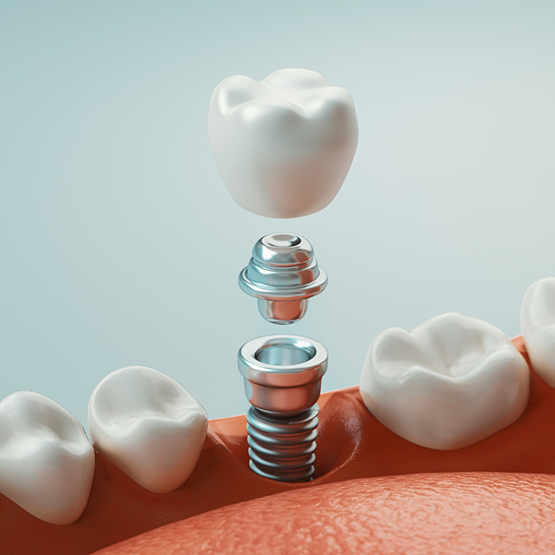
Dental implants are a series of small titanium posts that are used to anchor dental restorations in place, like a dental bridge, crown, or denture, to replace missing teeth without altering surrounding natural ones. The implants themselves are screw-like in shape and made from titanium. They’re designed to be secured beneath the gumline and into the jawbone to replace the missing roots of teeth. Then, after the customized prosthetics have been crafted, they can be permanently attached to the dental implants to restore the smile.
Dental Implants vs. Bridges
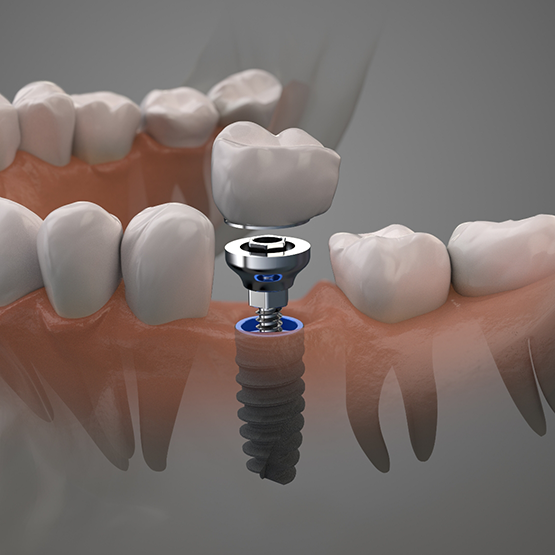
In most cases, implant bridges are more ideal than traditional dental bridges. Statistically, they last longer and are standalone restorations that add to functional support. Dental implants do have limitations; they may not be an option for someone with adverse health issues, including those who take certain medications, or someone with limited bone for proper placement. Lastly, the amount of time it can take to place them can be a limiting factor.
To allow time to adequately heal, proper dental implant placement following a tooth extraction can take as long as nine months before your final restoration is placed. Sometimes implants can be completed more immediately, but it generally takes between nine and 12 months from extraction to final crown placement.
Traditional dental bridges, on the other hand, can be completed in two weeks. The major downfall to bridges is that they are supported by the natural teeth. Many times, after several years, bridges can fail due to loss of a supporting tooth for the bridge. Dr. Anderson will be happy to discuss your options with you.
The 4-Step Dental Implant Process
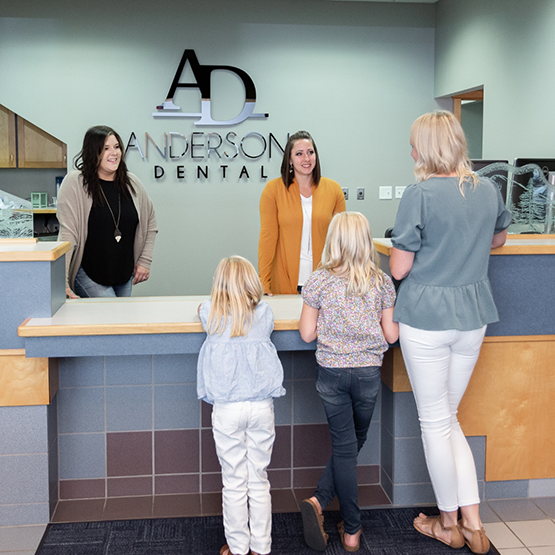
- Consultation: Your consultation will be with our skilled implant dentist in Rapid City, Dr. Anderson. Our team will capture diagnostic images of your mouth and facial structure, which Dr. Anderson will review, and we’ll complete a thorough oral evaluation. Based on his findings, Dr. Anderson can help determine whether you’re a good candidate for dental implants.
- Placement: Most of our implants are placed with a surgical guide following digital planning ahead of your appointment. This helps ensure that the implant is placed in the most ideal location for your restoration later on. Implant surgeries following proper planning typically only take about a half hour.
- Healing/Osseointegration: Recovery from implant placement is generally much easier than recovery from tooth extractions. However, it will take between three and six months for the implants to fuse with the jawbone, which must occur before Dr. Anderson and our team can restore the implants.
- Final Restoration: After your dental implants have fused with the jawbone and the abutments have been attached to the top of them, our team will be ready to secure the final restoration and complete your smile.
Benefits of Dental Implants

Dental implants come with a number of life-changing benefits, which is what makes them such a popular choice among patients. They have the ability to not only restore the function and appearance of your smile, but also prevent long-term jawbone erosion, which can change your facial shape. They’re also one of the longest-lasting tooth replacement solutions available, with the ability to last for over 35 years with good oral hygiene and professional maintenance.
Who Dental Implants Can Help

Whether you’ve lost one tooth or many, you’ll likely qualify for today’s dental implants. A good treatment candidate merely needs to have a fairly healthy mouth. As for how many teeth you’re missing, that’ll only affect the specifics of your final implant procedure. Our team can implement various treatment options once we’ve assessed your mouth, ensuring you get the best results possible. Please keep reading to learn more, or call our office for details.
Who is a Good Candidate for Dental Implants?

While almost all adults can get dental implants, the posts suit some patients more than others. Ideal treatment candidates usually have the following traits:
- Good Overall Health – Your body must be healthy for dental implants, as their placement counts as surgery.
- Excellent Oral Health – Since cavities and gum disease make implants fail, such issues should be addressed before treatment.
- High Jaw Density – A patient’s jawbone needs density for dental implants to succeed. Otherwise, the posts will become unstable and fall out.
Of course, those without the above qualities can still get dental implants. You’ll just need to undergo preliminary procedures first – gum disease therapy, tooth extractions, etc. If you want, our team can even help you schedule those services for yourself. We’d then perform your implant treatment once those procedures are done, basing the process around how many teeth you’ve lost.
Missing One Tooth
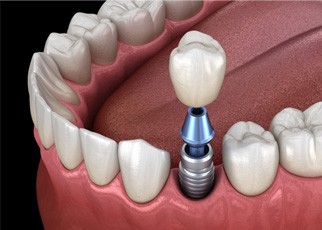
If you’ve only lost one tooth, you can get by with a single implant post and crown. A dentist can easily place these devices between healthy teeth without disturbing your mouth. In fact, the final implant would be less invasive than a normal dental bridge; placing it doesn’t involve “prepping” your teeth. Plus, your treatment results would be sturdier, longer lasting, and more seamless than those from a bridge.
Missing Multiple Teeth
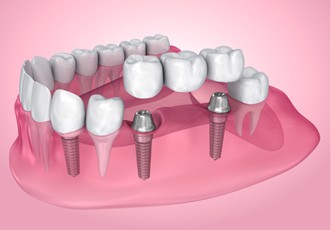
Our team advises a dental implant bridge when you lack multiple adjacent teeth. Unlike a regular one, this devise secures itself with implant posts instead of “abutments” (i.e., nearby natural teeth). That means a dentist doesn’t remove enamel to place it in your mouth. Better yet, the final appliance should last longer than a “normal” dental bridge would.
When the missing teeth aren’t adjacent, we’ll suggest a partial implant denture instead. It’d anchor itself to your smile with just a few dental implants.
Missing All Teeth
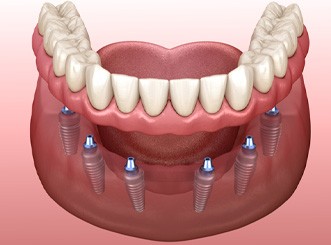
Someone who’s lost all their natural teeth would most benefit from an implant denture. For this prosthetic, a dentist uses four to six strategically placed implants to restore an entire arch. The final device will thus remain secure and not slip or fall like a traditional denture. On the contrary, it should be stable and steady for many years if given the proper daily maintenance.
Cost of Dental Implants

The cost of dental implants in Rapid City is likely to be higher than other similar forms of treatment (i.e., dentures and dental bridges); however, their long-term benefits make them worth the investment. It’s important to remember that not every case is the same, so the price you pay may not be as financially out of reach as you might think. Once you meet with Dr. Anderson and our team to discuss your case, we can develop a more defined cost estimate for you to review. From there, we will go over the different payment options and whether you plan to use your dental insurance to help lower portions of your treatment costs.
Preliminary Treatments & Dental Implant Surgery

Not everyone requires preliminary treatment before receiving dental implants; however, if we suggest additional services, such as gum disease treatment, bone grafting, a sinus lift, tooth extraction, etc., this will be factored into the overall cost of your care.
Additionally, once you are cleared for dental implant surgery, you can expect that this, too, will be included in your estimate. Since we can perform the start-to-finish procedure in-house, you do not need to worry about receiving a separate bill from an outside specialist.
The Parts of Your Dental Implant

The cost of your dental implants will also be influenced by the following:
- How many dental implants do you need? If only one titanium post is required, you can expect the overall cost to be much less than if you need 4-6 posts for an implant denture.
- What type of restoration do you need? It is easier and more affordable to create a single dental crown as opposed to a full denture.
- What kind of materials will be used to create your dental implants? The most common materials manufacturers use are zirconia or titanium because both integrate well with the jawbone.
- Which manufacturer will be used? Only our dental team can determine where your dental implants will come from. We will explain why we choose a particular type as well as why we avoid cheaply made options, which often do not last as long.
How Dental Implants Can Save You Money

While dental implants may cost more upfront, they are known to be cost-effective in the long run. Apart from their placement within the jawbone, which offers greater stability than dentures or dental bridges, they do not require adhesives to hold teeth in place. The price for this product can increase over time. Also, the lifespan of dental implants is generally 30+ years, so paying for regular relines or replacements is not required. Instead, you can enjoy life with a smile that stays in place and can withstand daily wear and tear much better than dentures or dental bridges.
Does My Dental Insurance Cover Dental Implants?

Most dental insurance companies will not provide coverage for dental implant placement; however, you mustn’t disregard other ways your policy may be able to help. Just because surgery may not be covered doesn’t mean that your consultation, preliminary treatments, or custom restoration won’t be. There is a good chance you will receive partial coverage for these services, which can lower your out-of-pocket costs significantly.
Making Dental Implants Affordable

If you do not have private dental insurance, do not assume dental implants are out of the question. Instead, you can enroll in a CareCredit plan that makes it easy to pay off your treatment over time. Through manageable monthly payments, you can choose a low-or no-interest option to help you stay in your budget and still receive a healthier, more permanent, and beautiful smile.
Dental Implants Post-Op Instructions

Dental implants are the best tooth replacement option available today. Since they replace the roots of the missing teeth, they allow for a wide range of benefits that you can’t experience with dentures or dental bridges. To achieve this, getting dental implants requires a multistep process. We will provide you with detailed post-op information. It will look similar to this.
What to Do Directly After Dental Implant Surgery

The most important part of dental implant recovery is to leave the blood clot at the surgical site undisturbed. This clot is necessary for the area to heal properly. Here are some things that you should avoid to keep this clot in place.
- Spitting: Swallow your saliva or use a tissue.
- Straw: The suction of the stray can dislodge the blood clot.
- Smoking: Don’t smoke following your procedure.
- Touching: Keep your tongue and fingers away from the surgical site.
Common Side Effects When Recovering from Dental Implant Placement

Side effects are common and to be expected following dental implant placement surgery. Here are some that you may run into.
- Bleeding: Minor bleeding during that recovery period is common. This can be reduced with clean gauze and light pressure.
- Inflammation: For the first 72 hours after your procedure, you may have some inflammation. This can be lessened with a cold compress.
- Discomfort: Soreness is common following dental implant placement. This can be managed with over-the-counter pain relievers.
Your Diet After Dental Implant Surgery

After your procedure, it is ideal to stick to softer foods so that you don’t aggravate that surgical site. Here are some suggestions.
- Scrambled eggs
- Mashed potatoes
- Pasta
- Soup
- Oatmeal
- Applesauce
- Yogurt
- Pudding
- Ice cream
Post-Op Health & Oral Hygiene

On the day following your surgery, brush your teeth and floss as you normally would. Be especially careful to avoid the dental implant site. To keep the area clean gently rinse your mouth with salt water after your meals. When you pick out a mouthwash, choose one that doesn’t contain alcohol. This is because alcohol can irritate the surgical site and cause discomfort.
What to Do After Your New Teeth Are Attached

After your replacement teeth have been secured to the dental implant, the difficult part is over. You may experience some slight discomfort and sensitivity as your mouth adjusts, but this should be easy to manage at home. At this point, you shouldn’t run into any swelling, bleeding, or extensive recovery. If you have concerns or questions regarding your post-op instructions, let us know so we can help!
Maintaining & Caring for Your Dental Implants

Congratulations on your new dental implants! These life-changing prosthetics have the potential to keep your smile complete, strong and healthy for a lifetime, but that’s only if you take excellent care of them. Unfortunately, if you neglect to protect your dental implants from damage and infection, they could fail or need to be completely replaced. The good news, however, is that with a few simple precautions and healthy habits, you can potentially enjoy your newly rebuilt smile for the rest of your life!
Make Oral Hygiene a Priority

One of the best things about dental implants is that unlike your real teeth, they can’t get cavities. But that doesn’t mean you don’t still have to practice excellent oral hygiene. Unfortunately, oral health problems like gum disease still could cause your dental implants to fail. Thus, be sure to maintain a thorough hygiene routine that includes brushing twice a day with a soft-bristled toothbrush, flossing daily, and using a mouthwash or rinse.
Eat a Healthy Diet

The great news is that unlike other tooth replacement options, with dental implants you can once again enjoy a complete diet, full of the nutritious, delicious foods you love. However, be aware that overindulging in foods that are too hard, sticky, or sugary could be harmful to your dental implants. Thus, be sure to eat plenty of foods that are packed with calcium, vitamin D, and vitamin C. These will keep your jawbone strong and your gum tissues healthy, protecting your newly rebuilt smile.
Break Bad Habits

Bad habits like smoking, vaping, chewing tobacco, using your teeth as tools, or chewing on hard objects can cause your dental implants to break or fail, so be sure to quit these dangerous behaviors as soon as possible. Dental implants were designed to restore much of the biteforce provided by your real teeth, but they weren’t designed to open packaging or bite fingernails, so its best to only use them for food.
Protect Your Dental Implants

While it’s true that your new dental implants are extremely strong and durable, they’re not completely indestructible. Thus, if you play sports, always wear a sports mouthguard, and if you grind your teeth or clench your jaw (bruxism) talk to your dentist about a getting custom mouthguard that will protect your teeth, dental implants and jaw from excess wear and tear.
Schedule Regular Dental Checkups

Even if you have no remaining natural teeth, it’s still important to visit your dentist every six months for your regular, preventive dental exams and cleanings. These give your dentist the opportunity to examine your dental implants and make sure they are still in good condition, as well as keep them looking as clean and bright as the day you got them. If any issues are developing, these appointments will also allow us to reverse or treat them before they become a bigger problem.
Dental Implant Technology
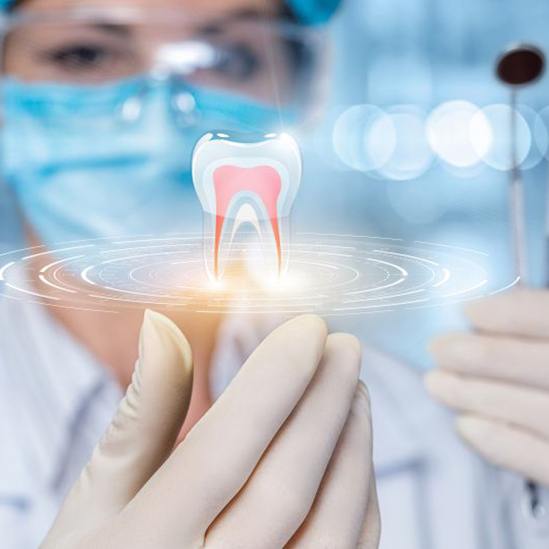
Dr. Anderson and our team are committed to providing top-quality treatment. Our skill and experience are two elements that help us do just that. However, we could not accomplish what we do without the assistance of some advanced dental implant technology. What are some of the specific instruments we use that can play a role in your tooth replacement journey? Here is an overview of just a few of them:
CBCT Scanner
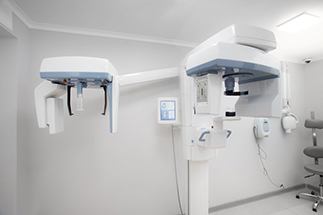
CBCT stands for cone beam computed tomography. A CBCT scanner is also known as a cone beam scanner. Essentially, this machine is a highly advanced X-ray machine. It uses the same type of radiation as traditional X-rays, but it is emitted in a cone-shaped beam. Therefore, the CBCT scanner is able to capture incredibly detailed, three-dimensional images of your oral structures.
We use the CBCT scanner as an integral part of treatment planning. It helps us understand your oral anatomy, and it allows us to determine exactly where, at what depth, and at what angle to place your dental implants. After your implants are in place, we can use the scanner to monitor osseointegration (the process of your implants bonding with your jawbone). On the off-chance that your implants ever develop a problem, our CBCT machine can help us arrive at an accurate diagnosis.
Guided Dental Implant Surgery
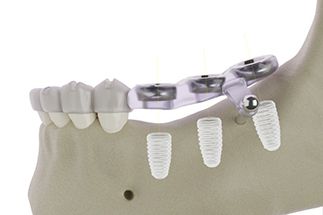
Most dentists perform freehand dental implant surgery. Essentially, that means they use scans of your mouth to understand where your implants should be placed. However, during the surgery itself, they have nothing more to guide them; they have to take an educated guess as to the placement of your implants. Freehand surgery is successful in the majority of cases. However, there is a more accurate and reliable way.
In our Rapid City office, we use our CBCT machine to create surgical guides. During your surgery, the guide is placed over your teeth, and it allows us to place your implants in the most precise way possible. This minimizes the risk of human error and might decrease your chances of dental implant failure or other complications.
Although the process of creating a surgical guide adds a bit of time and effort to your tooth replacement journey, it is well worth it!
Digital Impression System

When you are ready to receive your restoration (crown, bridge, or denture) for your implants, we will need to take some impressions of your mouth. A lot of practices in our area use manual impression materials. You would have to bite down on an impression material and stay perfectly still while it set.
Digital impressions are easier. We simply have to move a wand-like device around your mouth. It captures thousands of images and then assembles them into a digital representation of your smile. We can then use that impression to design a restoration that is tailored to your unique mouth with remarkable precision.
Dental Implant FAQs
How Long Do Dental Implants Last?
Your new dental implants can last for 30+ years with proper care and usage, but their lifespan greatly depends on your health and lifestyle. To ensure that they last as long as possible, care for your teeth (both prosthetic and real) by brushing twice a day, flossing once a day, and rinsing regularly with mouthwash. Furthermore, continue to see Dr. Anderson for your regular, biannual exam and cleaning appointments.
Protect your dental implants from damage by avoiding chewing on anything that is too hard or sticky or using them to open packaging. Smoking and using tobacco products have also been linked to dental implant failure, so it is important to quit these habits if you haven’t already.
Dental implants often last much longer than traditional dentures and bridges and if well maintained could even last a lifetime!
Can I Take Dental Implants Out?
No, you cannot take your dental implants out, as they are fixed to the bone. They can only be removed by a dental professional. Do not attempt to remove your dental implants yourself.
There are some types of implant dentures that can be removed for cleaning; however, the posts are not removable, only the denture itself.
Does Getting Dental Implants Hurt?
Your mouth will be numbed with a local anesthetic before the start of your dental implant procedure, and you should not feel any pain during treatment. You may also be sedated, which will lower your body’s ability to register pain.
Though your jawbone doesn’t have many nerve endings and the surgery itself should not hurt, your mouth may still be sore for a few days afterward. For relief, you can take prescribed, or OTC pain medication as directed and apply cold compresses to your face over the dental implants.
If your discomfort worsens instead of improving after two or three days, please call Dr. Anderson for assistance.
How Successful Are Dental Implants?
When placed by a skilled professional, dental implants have a success rate of over 95 percent, even after ten years! However, the success rate of your implants depends on how well you take care of them with oral hygiene practices, routine dental check-ups, a nutritious diet, and healthy oral habits.
The success of your dental implants can also vary based on the location of the implant within your mouth. Molars receive more strain from chewing than your front teeth do, and thus they are slightly more likely to fail.
Are Dental Implants Safe?
For most patients with sufficient oral health, dental implants are typically very successful when placed by a qualified dental professional.
If you do have low jawbone density or gum disease, your dentist can help you fix these problems via preliminary treatments designed to make your dental implant surgery safer and more successful.
If you have diabetes, cancer, or any other medical condition that could cause dental implant surgery or recovery risk, your dentist can discuss this with you during your consultation and plan accordingly.
What Can Cause Dental Implants to Fail?
Although it is uncommon, dental implant failure typically occurs for one of two reasons: peri-implantitis, or failed osseointegration.
Peri-implantitis is a form of gum disease that is caused by poor oral hygiene. It can damage the bone and gums supporting the dental implant, causing it to loosen.
In other cases, the dental implant may fail to integrate with the jawbone, particularly if the patient had low jawbone density to begin with.
Other causes of dental implant failure may include chronic teeth grinding, tobacco use, poor oral hygiene, certain medications, radiation to the head and neck, and certain health conditions such as diabetes, cancer, osteoporosis, and autoimmune disorders.
Your dentist will provide you with a set of guidelines for lowering your risk of dental implant failure.
Am I Too Old to Get Dental Implants?
The great news is there is no upper age limit for dental implants once you have reached adulthood. Provided that you are in decent oral health with sufficient jawbone density, you could be in your 30s, 40s, or even your 80s and beyond and still qualify for dental implants.
However, please be aware that seniors may be more likely to have other health conditions present that could complicate your dental implant treatment.
Can I Receive Teeth Whitening If I Have Dental Implants?
Because all the materials used in dental implants are extremely strong and durable, teeth whitening treatment will not cause damage to your dental implants. This means that if you have any natural teeth in addition to your dental implants, they can be whitened.
However, be aware that the dental implants themselves cannot be whitened since they’re made of inorganic materials like porcelain or zirconia. The good news is that your dental implants can be easily replaced should they become stained or discolored.
How Can I Tell If My Dental Implant Is Failing?
Common warning signs of dental implant failure include severe pain around the dental implant, inflamed or swollen gums, or a feeling that your implant is loose. You may also experience changes in your bite.
Should you notice any of these symptoms, please call Dr. Anderson right away, as these issues will only get worse without professional intervention.
Dr. Anderson may be able to save your loose dental implant in Rapid City regardless of whether it is soon after placement or after some time, but please contact us as soon as possible for assistance.
Am I Too Young to Get Dental Implants?
Because most people’s jaws aren’t fully developed until young adulthood, dental implants in Rapid City cannot be placed in patients under the age of 18. If they are placed before the jaw is fully grown, it could interfere with bone development and potentially result in serious complications. Furthermore, be aware that generally speaking, men’s jaws take longer to develop than women’s jaws do.
The good news is that there’s no upper age limit for dental implants.
How Long Does It Take to Recover from Dental Implant Surgery?
In most cases you should be able to return to your normal activities the day after your dental implant surgery. However, the recovery itself could take six or more months to complete while your dental implant fully fuses with your jawbone. Although there’s nothing you can do to speed up this process, there is still plenty you can do to accommodate it.
It is important to avoid strenuous exercise for the first week or so as this will divert blood away from your surgical sites and delay healing.
Bleeding should stop after the first couple of days, and swelling should subside after about three or four days.
Be sure to take your prescription or OTC pain relievers as directed by Dr. Anderson, and please contact us if you continue to experience serious pain.
Will I Have to Take Off Work for Dental Implant Surgery?
The good news is that most patients will only need to take one or two days off to get dental implants in Rapid City. Of course, every case is different, and Dr. Anderson can give you a more accurate timeframe based on your unique case. For example, should you require any preliminary treatments before your dental implant procedure, you may need to take additional time off.
If your job is physically demanding, it may be a good idea to take at least three or four days off, as heavy exertion could divert blood from the implant site and delay the healing process. You may also want to schedule the procedure for a Thursday or Friday.
I Need a Checkup & Cleaning I Have a Cavity or Broken Tooth I am Missing One or More Teeth I Want to Enhance My Smile I Want a Straighter Smile I Have a Dental Emergency I am Worried About Gum Disease I Have Jaw Pain & Headaches I am Scared of the Dentist I Have Sleep Apnea/Snore View Our Services
